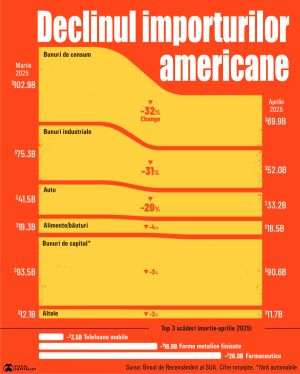The free market, without government restrictions, and governed by the rules of fair competition, is the essential condition for the economic growth of our country in the coming years, stated the participants at the conference "Competition in key sectors - 2024," organized yesterday by the Competition Council, at the Central Library Carol I University, from Bucharest.
At the opening of the event, Bogdan Chiriţoiu, the president of the Competition Council, said that the Report on competition in key sectors for the current year - a document drawn up by the institution he leads - "is a mixed one, with good and less good things", but which has three positive conclusions, the first being the stabilization of inflation at annual values between 4-5%, close to the pre-pandemic ones.
Bogdan Chiriţoiu stated: "The positive thing is that, although we went through inflation, Romania remained the country with the lowest food prices in the European Union, according to Eurostat, which is a good thing, both for consumers and for us , because it means that the market remained competitive. However, we also see some areas of the economy where prices are higher, situations that we have investigated and will continue to do so, as these increases are a red flag that there are distortions in a particular sector and it is possible that these distortions are caused by anti-competitive behaviour. Regarding the investigations started, we are at a maximum level, with 60 ongoing investigations, investigations in which we also use the new legislative instruments that complement the competition law".
The head of the Competition Council also said it showed that 25% of the economic sectors registered a decrease in competitive pressure, due to some economic concentrations that took place in the last year.
Bogdan Chiriţoiu stated: "We were relaxed regarding some economic concentrations, but there are probably sectors where a greater concentration becomes harmful for consumers and for the competitive environment. At the moment we have two problematic concentrations. The first concerns Mega Image's acquisition of Profi stores, a concentration for which we have published the measures thought out with Mega Image to preserve competition and protect consumers, but we are also interested in upstream competition, that is, how suppliers are treated. The second concentration concerns the sale of Telekom, which we expect to be completed by December 31, 2024. After it, only three big players will remain in the communications sector, and it is important to keep the good things, i.e. low prices for services telecommunications and high network and signal quality for users'.
• Chiriţoiu: Extending state intervention in the energy market means increased risk for the reappearance of "smart guys"
Mr. Chiriţoiu also showed that one of the conclusions of the report drawn up by the Competition Council is the finding that we are facing a slowdown in economic growth at the national level, a slowdown that is linked to what is happening in strong European economies, especially in the German economy.
He stated: "This shows that we cannot think of Romania as an island vis-a-vis the European Union. If things do not go well in Europe, we cannot be an island of prosperity, because we depend on what happens around us in this context. At the moment, the European Union is going through a change, but also a stage of reflection - see the Draghi report on European competitiveness and the Letta report on the deepening of the EU internal market crisis. Romania must support the reforms provided for in the two reports".
The President of the Competition Council also said that one of the conclusions of the report drawn up for the current year refers to the future decrease in liquidity.
Bogdan Chiriţoiu stated: "I think it is clear that there will be less money in the future, that we will not be able to maintain budget deficits of 7% - the largest in the EU - because European rules do not allow us to do that. It is risky to have a large budget deficit in the event of a major economic crisis such as the one that occurred in the period 2008-2011. That is why we believe that measures should be taken in time to reduce the risks. When you don't have money, you have to be smarter. Next year we must increase our potential for economic development. (...) We will have to rethink state interventions in the economy, as was the case with the RCA, in the area of food products and energy. These interventionist measures are necessary in times of crisis and high inflation. We have passed this period, we are returning to the pre-war period in Ukraine, and we need to see which of these measures still make sense, because their long-term extension will do more harm than good, by generating perverse effects and undeserved gains. For example, in energy we are not at the stage of the smart guys, but there is a risk that we will relive those times. That is why measures are needed to ensure the sustainability of the markets, but also the protection of truly vulnerable consumers".
Omer Tetik, CEO of Banca Transilvania drew attention to the fact that the economic axis is moving from the Atlantic to the Pacific area and that at this important moment the European Union has leadership problems, not just innovation. His lordship stated that if our country now has a good situation regarding companies and the labor force, there will be a few difficult years for the world economy and for the national one, during which the biggest challenge will be the capitalization of companies. Omer Tetik stated: "Pay close attention to capitalization, to liquidity, because companies have become accustomed, with state guarantees, to no longer pay interest on loans taken, and the next period will be a tough, difficult one for them. We need much better capitalized companies, attractive for investors, with business continuity and investments in areas where Romania has growth potential".
• Foreign direct investment, drastic decrease in the current year
One of the problems that should be solved by the authorities is the restructuring of public spending, said Mihai Daraban, the president of the Chamber of Commerce and Industry of Romania, who also said that this restructuring is essential for attracting investments and for ensuring a sustainable budget balance. Daraban emphasized the importance of low taxation and long-term stability to support the attraction of investments and the development of the Romanian economy: "What else could be left to attract investments? Low and predictable long-term taxation. I am terrified of what awaits us from January 1 onwards, because it is normal for the settlement to come at some point. Perhaps the international financial bodies were somewhat complicit in what happened in the domestic market. They didn't put pressure on us, they said not to interfere, not to affect the electoral process, but I think the settlement will come".
According to data presented by Daniel Anghel, president of the Foreign Investors Council (FIC), foreign direct investment (FDI) fell by 21.3% in the first seven months of 2024 compared to the previous year, reflecting less investor interest compared to 2022, when Romania recorded a record of 10 billion euros. This decline is attributed to fiscal and budgetary uncertainties, which have reduced foreign investor confidence. He stated that in 2025, only 36% of companies active in Romania intend to increase their investments, being the lowest level in the last four years. However, 65% of investors expect an increase in revenues in the coming year, and 66% expect an expansion of the domestic market. These statistics suggest that, although there is a tendency towards caution, the Romanian economy has potential for development in the consumption and export sectors.
According to the president of the FIC, all this would happen in the conditions where next year the state budget needs an additional income, in the amount of 23 billion lei.












































